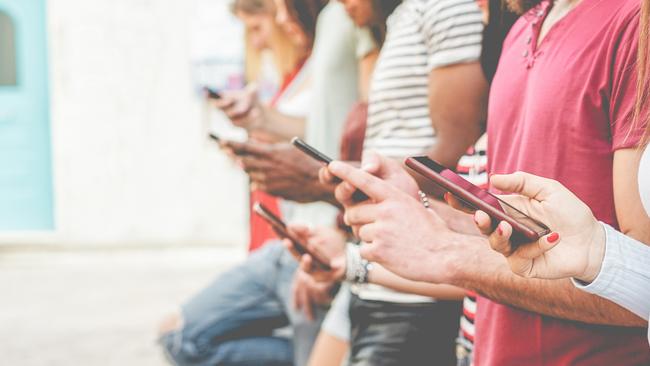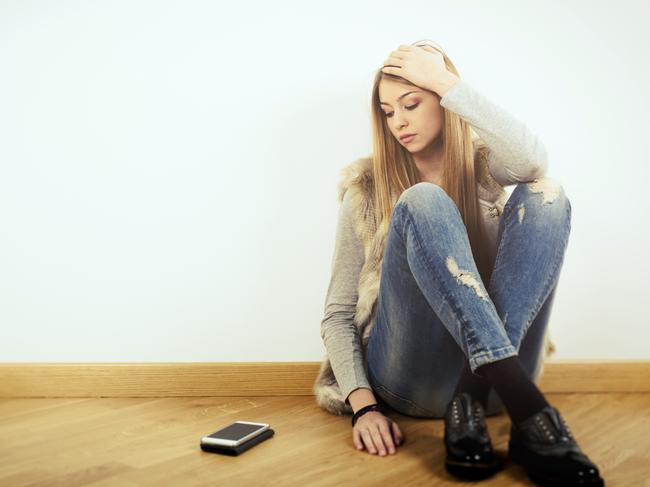Angela Mollard: We’re failing ‘generation sicknote’ and it’s critical
A refusal to allow kids the risk necessary to grow resilience and a laissez-faire approach to the ever-present tech devices in their hands has left a generation broken, writes Angela Mollard.

Opinion
Don't miss out on the headlines from Opinion. Followed categories will be added to My News.
When I was 28 a very significant relationship in my life came to an end. I was living on the other side of the world in London with no family around and suddenly found myself without a home.
It was tough. I was heartbroken. And to make matters worse it was February – the coldest, darkest, soul-destroying month to lose grip on life as you knew it.
But I did what I’d always done. I soldiered on. A dear friend moved me into her flat and listened as I sobbed. In the morning I got up, got dressed and went to work.
Every Thursday for eight weeks I saw a counsellor at 7.45am before heading into the office at 9am.
That episode taught me many things but more than anything it proved to me something I still know to be true: when life is challenging work can be both a salve and a distraction.

Which is why I’m alarmed that a new study has found that there’s been a huge increase in the number of young adults not at work because of their mental health.
‘GENERATION SICKNOTE’
They’ve been dubbed “generation sicknote” with a third of 18 to 24-year-olds experiencing symptoms of mental illness, up from a quarter at the turn of the millennium.
The study, showing that those in their early 20s are now more likely to be unemployed due to ill health than those in their early 40s, was undertaken in the UK but mental illness trends in Australia align with those overseas.
I don’t need to cite the research.
A friend tells me he’s so used to staff calling in sick due to their mental health that he has a template email he sends out with a comforting message and the phone number of a psychologist.

Another who helms a busy marketing company says she’s surprised when two days pass without a member of staff crumpling in her office.
She’s compassionate, obviously, but worries about heaping extra work on other members of her team and fulfilling what she’s promised to her clients.
“I worry for their lack of resilience,” she tells me.
I’m not annoyed at Generation Sicknote.
Rather, I feel deeply concerned for them because the truth is that we have failed them.
These kids whose childhoods coincided with a new century and all the technological advances that came with it, have been the guinea pigs in a hideously unchecked and life-altering social experiment that in less than two decades has become our new normal.
The mental health crisis that’s resulted is severe and impactful. And yet we continue to do very little parentally, educationally and legislatively. Like rubberneckers in the aftermath of a car accident, we look on slack-jawed, concerned but paralysed by inaction.
Next month a new book by US social psychologist Jonathan Haidt will claim that two trends – overprotection in the real world and under-protection in the virtual world – are the major reason why children born after 1995 became the anxious generation.
Those two forces, a refusal to allow our kids the risk necessary to grow their own resilience coupled with a laissez faire approach to the devices that have snuck ever more determinedly into their hands, have left a generation broken.
Now is the time to fix it.
More than five years ago this newspaper reported that social media and screen addictions could be behind a national youth mental health crisis, with record levels of young Australians in severe psychological distress.
That was 2018. It’s now 2024.
There is still no national policy around mobile phones in schools with each state and territory adopting their own rules. For parents like me who had one child at a school where phones were banned and another where they were permitted the benefits of a ban have been blindingly obvious for years.
As Haidt will argue in The Anxious Generation, we have “rewired” childhood, allowing kids to bury themselves in their devices at a time when they are socially insecure, vulnerable to peer pressure and desperate for validation.
As their pliable brains suck in everything from body image messaging to bullying to porn we shake our heads in despair because their protests get us every time: “My friends are online.”
A friend with an 11-year-old girl sends me a picture of her daughter with three friends.
Two are holding smart phones. What if their parents clubbed together and decided they weren’t having smart phones? She sighs: “No one wants their kid to miss out because they’re so fixated on them being popular.”
But we need the parent tribe more than ever. The current mental health crisis, and accompanying school absences, has shown us that.
And while some experts argue that we now medicalise everyday stresses and strains, a pivot towards resilience will not happen overnight.
When we learned kids were dying in cars without restraint, we mandated seatbelts.
We need to do the same with technology. No child should be on social media before they’re 16.
We need a comprehensive rethink around technology if our kids, and our workplaces, are to flourish.
Originally published as Angela Mollard: We’re failing ‘generation sicknote’ and it’s critical




